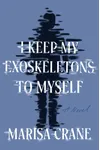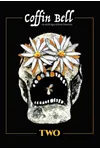Picture an American storyteller who spun a dystopian world where shame casts extra shadows—meet Marisa Crane! A rising star in science fiction, Crane’s debut novel, I Keep My Exoskeletons to Myself, has captivated readers with its queer heart and poetic prose. Their work blends speculative fiction with raw emotion, making them a fresh, vital voice in the literary scene.
With a knack for crafting unforgettable characters, Crane explores themes of grief, resistance, and queer love in a way that feels both intimate and revolutionary. Let’s dive into the life, works, and impact of this sweatpants enthusiast turned award-winning author!
The Making of Marisa Crane
Born in Allentown, Pennsylvania, Marisa Crane—also known as Mac—grew up with a love for basketball and storytelling. A former college basketball player, Crane’s competitive spirit translates into their writing, where they tackle big ideas with precision and grit. They honed their craft at prestigious workshops like Tin House and Bread Loaf Writers’ Conference, earning fellowships from Sewanee and American Short Fiction. Now based in San Diego with their wife and child, Crane’s personal experiences as a queer parent shape their deeply human narratives.
Crane’s early career saw their stories and essays published in outlets like Prairie Schooner, Joyland, and Lit Hub. Their 2019 poetry collection, Our Debatable Bodies, hinted at the lyrical style that would define their prose. It was a self-shaming poem about shadows, written years earlier, that sparked the idea for their breakout novel—a testament to how Crane transforms personal vulnerability into universal stories.
Marisa Crane’s Unforgettable Stories
Crane’s debut novel, I Keep My Exoskeletons to Myself (2023), is a lyrical masterpiece set in a near-future America where wrongdoers are marked with extra shadows. The story follows Kris, a queer mother grieving her wife’s death, as she raises a daughter born with a second shadow. Critics, including The New York Times, praised its meditation on queer parenting, chosen family, and resistance against an oppressive state. The novel won the Lambda Literary Award for LGBTQ+ Speculative Fiction and was named a Best Book of the Year by Esquire and Library Journal.
Their forthcoming second novel, A Sharp Endless Need (set for release on May 13, 2025, by Dial Press), promises to deepen Crane’s exploration of human connection. While details are scarce, it’s already generating buzz as a must-read. Crane’s short works, like the poetry collection Our Debatable Bodies and the chapbook 3 A.M. Heartbreak Material, showcase their versatility, blending humor, heartache, and sharp social commentary.
Crane’s style is a unique cocktail of poetic precision—think Ocean Vuong—and fierce honesty, reminiscent of Sheila Heti. Their speculative worlds feel eerily familiar, tackling shame, grief, and systemic injustice with dry humor and unapologetic queerness. By centering queer families and marginalized voices, Crane crafts stories that resonate long after the final page.
Why Marisa Crane Matters
Marisa Crane’s work is a beacon for queer readers and advocates of prison abolition. I Keep My Exoskeletons to Myself challenges the punitive impulses of the justice system, offering a vision of healing through community and love. Their focus on queer resistance and chosen family speaks to anyone navigating a world that feels stacked against them. Crane’s ability to weave personal grief with societal critique has earned them comparisons to literary giants like Ursula K. Le Guin.
As a new voice in science fiction, Crane is reshaping the genre by grounding dystopian narratives in emotional truth. Their work inspires readers to question authority, embrace vulnerability, and find hope in connection—a legacy that’s only beginning to unfold.
- Born: Allentown, Pennsylvania
- Key Works: I Keep My Exoskeletons to Myself (2023), A Sharp Endless Need (2025), Our Debatable Bodies (2019)
- Awards: Lambda Literary Award for LGBTQ+ Speculative Fiction (2023)
- Fun Fact: Crane is a former college basketball player and self-proclaimed sweatpants enthusiast!
About Marisa Crane
Snag I Keep My Exoskeletons to Myself and dive into Marisa Crane’s bold, beautiful world of queer speculative fiction. Trust us, you’ll be haunted by their words—in the best way possible!

